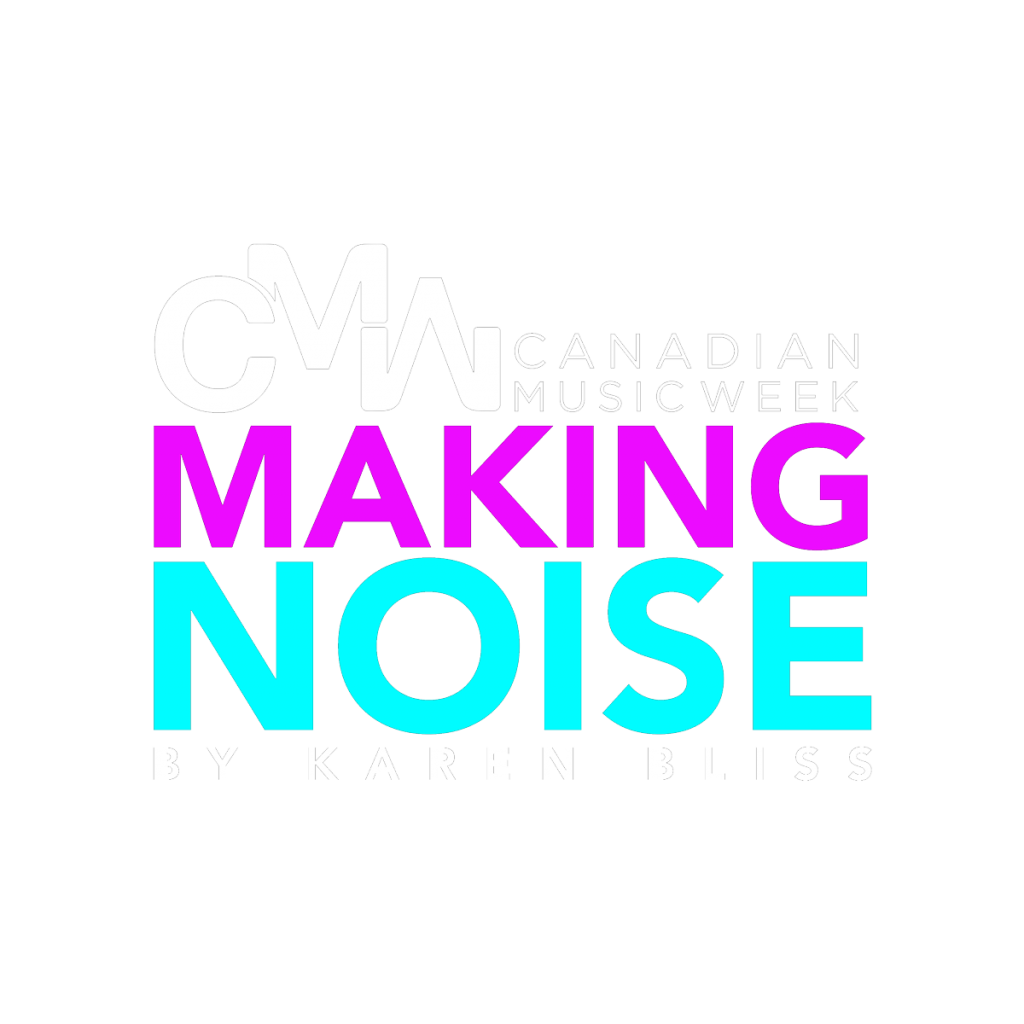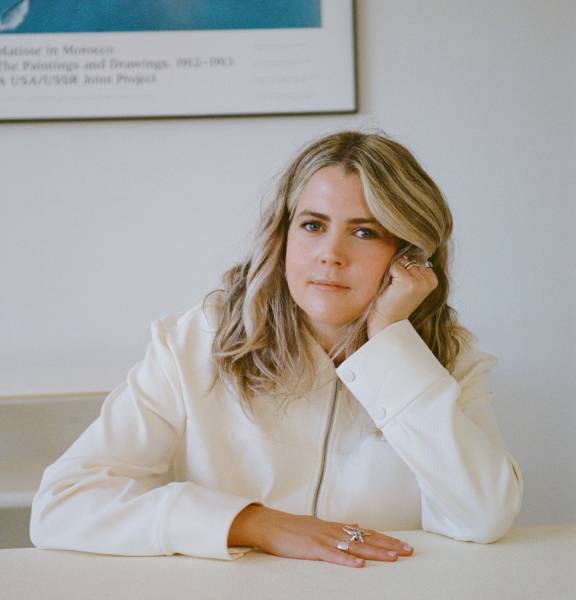BY KAREN BLISS

Richard Flohil may not move like Jagger, but at the seen-it-all age of 89 — turning 90 on June 24 with a music-filled bash at Toronto’s Lulu Lounge — the man with the trademark white silk scarf draped around his neck, heavy British accent, likely holding court with “smart, young, bright, focused people” — is still going out to see live music on a weekly basis — last year almost 150 times.
The former music trade writer, publicist, concert promoter, festival programmer, and manager has age-defying energy and an enthusiasm for music that has not waned over 70-some-odd years in the business.
Known for his engaging personal stories about a range of artists — Muddy Waters, Louis Armstrong, Bonnie Raitt, Leon Redbone, Ani DiFranco, Loreena McKennitt, k.d. lang, Serena Ryder, and countless more — the raconteur was told by friends and colleagues so many times to write a book that he finally started one a decade ago, before deciding, instead, to create a Substack blog called Stories From The Edge of Music.

Born in Selby, Yorkshire, England, he started his journalism career at age 16, apprenticing for the Evening Press, then was hired as chief reporter for The Selby Gazette and the Herald. He relocated to Canada in 1957, where he began freelancing and editing trade magazines. In 1970, for more than 20 years, he edited The Canadian Composer, the in-house publication for performing rights organization CAPAC (now SOCAN), and contributed to the long defunct weekly trade magazine The Record
He dabbled in other areas of the business along the way, presenting concerts for the likes of Waters, Redbone, Miles Davis, Benny Goodman, John Prine, Long John Baldry, Jeff Healey, B.B. King, Buddy Guy, The Chieftains, Bobby “Blue” Bland, Ry Cooder and Ian Tyson.. He also handled publicity, via Flohil & Associates, for such disparate talent as Sir George Martin, Eric Idle, Alice Cooper, Chuck D and Billy Connolly.
A lifelong blues and folk music fan, he also managed the legendary Downchild Blues Band for several decades and was program director for the famed Mariposa Folk Festival. He has also emceed stages and workshops at the Edmonton Folk Festival, Calgary Folk Festival, Winnipeg Folk Festival and Guelph’s Hillside Festival.
He received his first industry honour in 1990, the Special Achievement Award at the CASBY Music Awards. He was still in his 50s. There’s been many more since, including the 2005 Blues Booster Award from the Toronto Blues Society, 2006’s Estelle Klein Award from Folk Music Ontario, 2010’s Spirit of Folk Award from Folk Alliance International, 2016’s Unsung Hero Award from the Canadian Independent Music Association (CIMA) and the 2017 Hall of Fame from the Mariposa Folk Festival.
While he is essentially retired, you would never know it. He is still out there, championing artists, usually young and yet-to-be discovered by the industry at large. Extend him an invitation to live music and he will almost always say yes — unless he has another show that conflicts.
This summer, he will actually be listed on the lineup for the Calgary Folk Festival, alongside BC-based banjo player, guitarist and singer Tamara T. Nile, for a story and song collaboration. “A 90-year-old rock star storyteller and banjo queen,” is how Nile describes it to Making Noise. “Kinda has a nice ring to it,” she says. “We dreamed up the idea, as we do most things, trying to come up with excuses to hang out and act like giddy teenagers together. We’ve been best of friends since 2006 and counting. Just love him so much and can’t wait to share our music and stories for an audience this summer.”
In this interview with Karen Bliss, Flohil talks about getting “the hell out of the apartment” to see live music, why Louis Armstrong brought up laxatives to him, his 90th birthday and summer plans, and what the recent photo with electrodes all over his head is all about.

What is it that draws you, at 89 years old, 90 next month, to go to bars and clubs until 2 a.m., to go to venues at all, and even get on a plane to go to music festivals?
I keep a list in my journal. Last year, I went to 148 shows. This year, so far, I’ve only been to 49. I’m falling back.
Often, of course, I go and see people. Since I live on an old age pension these days, I don’t exactly have a shitload of money to buy Taylor Swift tickets, as much as I would like to, but I do think you can get value for money hearing or finding artists that speak to you that are working in clubs and pubs and bars for 10 bucks in the jug.
And there are people like that who I see fairly regularly. There’s a songwriter in Toronto called Corin Raymond. And Corin is somebody that speaks to me. His songs speak to me. His personality. And he’s young and da-da-da-da-da. He’s not gonna be a major star. And it doesn’t matter. He has a great song called “There Will Always Be a Small Time.”
How crucial is live music to your well-being and your ability to keep active?
I’m not sure I can answer that. I just keep going out. I’d rather go out and hear live music than sit at home all day and write my Substack column or look at what’s happening on my computer screen. Get the hell out of the apartment and see live music and support live music. This is something that I’ve always done. There’s a wide range of music that attracts me.
I went to the other day to see a group called CATL, a duo, husband and wife, and they are probably the loudest act I’ve heard since I remember seeing The Who at Maple Leaf Gardens a thousand years ago. The point I wanted to make was that I would go and see a folk artist, a blues artist, a country artist, a power rocker, all in a day’s work and a day’s enjoyment.
We all have old friends, not in the music business, who say they don’t like today’s music and music’s not as good as it was in the 60s or 70s. Is that just silliness?
Well, when I was a teenager, the kind of music I loved almost does not exist anymore. It was the British attempt to play early American jazz. The fact that it was cool, incredibly popular, etc., etc., my father hated it. “How do they know when to stop?’ he used to say [laughs]. And, yeah, there’s a lot of music today I don’t like. I’m not particularly entranced by EDM. I don’t like a lot of current rap stuff because I find it misogynistic and not aimed at me.
I know you sometimes go out to see an act that you think you won’t like and then you end up liking them, some of the younger artists. You give music a chance. You are open.
I try not to emulate my father. If it’s not my cup of tea, I won’t particularly diss it, but I will certainly not support it by my presence.

You go out a lot. The past few years, sometimes you are having a tough time, but you have a really supportive group of younger songwriters, friends, who get you out of your apartment and check up on you.
Well, that’s very true. I do. Fortunately, my brain seems to be reasonably working well. My body, of course, is beginning to fall apart. Everybody’s does at this age. But you just keep going. I’m constantly surrounded by smart, young, bright, focused people, and they keep me sane. They introduce me to new music. I can ramble on and be an old fart and talk about old shit that makes my heartbeat faster.
I’m sure I’ve said this to you before. I know I say it to other people. You are my inspiration. I want to be like you in my 80s, if I live that long, and into my 90s, still going to concerts. I don’t want to be sitting on a porch learning how to crochet.
I have to say, that like everybody else, I resented the covid years, and I resented them because, at my age, two years of doing nothing is gone forever. You’re not getting that back.
Some people were very creative, and I would have been if I had known it was going to be two years. I’d have learned French, or learned the guitar, or finish writing this stupid book project, which I abandoned.
Let’s talk about that stupid book project because the other thing that you are known for are your incredible stories. You are a storyteller. You’re a writer. What was the difficulty for you finishing this book started a decade ago?
The difficulty was that the book was written and designed, as we went along, more to look like a magazine, than a text-only book. My collaborator [graphic designer] Michael Wrycraft, died [May, 2022] and that was an incredible blow to the future functioning of the book as we were making it. My friend [music industry pioneer] Al Mair, who was a financial backstop, said, “If you run out of money, or you need some help, I’m there.” And he died [Nov. 2022]. And I thought, “Well, if you think things go in threes, it’s a good time to quit while you’re ahead.” [laughs] So, I did. And during covid, I wrote nothing. I dribbled the time away. But then, I discovered this platform called Substack, an ad-free place, where writers can put up their work, and people can read it for free. But, if they like it and can be persuaded, they can actually pay you a little bit of money. Right now, I started repurposing some of the material that I’d written for the book, and I added other stuff, and then I wrote new stuff. And for the last 33 weeks, I’ve been telling these stories.

Your stories are incredible. Usually quite funny. Just an enviable list. Muddy Waters, BB King, Buddy Guy, Bonnie Raitt.
I understand that. But I do have a feeling that anybody in any profession — it could be plumbing, or electrical contracting — that is passionate about their work and goes about it with an open heart and an open mind and don’t get any stories, they’ve blown it big time. I find stories every day and my memory finds other stories.
I read biographies. I’m reading two at the moment. One by a guy, a record producer, a record company owner [Hannibal Records], and the guy who produced the first Pink Floyd singles, called Joe Boyd. I’m reading his, I think it was from 2006 [White Bicycles: Making Music in the 1960s] I’m rereading it. Fascinating. I’m reading Geddy Lee’s book [2023’s My Effin’ Life], which is a bit heavy. I mean, quite literally, it’s 500 pages or something [laughs]. It weighs a ton. But it’s fascinating, and far more engaging and intriguing and interesting than I thought it would be. I’m reading a book currently about Bessie Smith [2021’s A Poet’s Biography of a Blues Legend], who was in the 30s the “Empress of the Blues” and who died in a car wreck and who is a direct linear antecedent of artists like Aretha Franklin. I mean, that’s pretty wide-ranging.
In my line of work as a journalist, if I’m writing about someone new or they need a bio and feel they “don’t have a story,” I always tell them everyone has a story.
Yes, everybody does. And the job of writers is to find those stories and tell them.
You mentioned Substack and that’s another unique thing about you, in your late 80s, embracing a new online platform. Some people in their 80s don’t have cell phones or a computer. Obviously, you started your career when it was the written word and the typewriter then the computer came along, as well as cellphones and social media. How have you found keeping up with technology?
Well, I have not done well. Everything I write on my Substack column — and I’ve done pieces on everybody from Ani DiFranco to k.d. lang to Ray Charles to Louis Armstrong to Solomon Burke, which is the first one I ever did; it’s still one of the best things I’ve ever written — I write this stuff, but the actual mechanics of editing it, laying it out, and uploading it is done by a friend of mine [Michael Barclay] who knows this stuff better than I do. So, I have help.
I’ve not been good at keeping up. I still have problems dealing with computers. I mean, I got my first computer in ‘82, I think. It was a slow-moving, ugly Mac that cost about $6000 and everything’s gotten a lot better since. I’m holding in my hand a computer that I’m buying bit by bit from the Bell that will cost, what, $1,200? It’s got everything. I have a laptop and I have a giant desktop, which I live by. But I have not really kept up. Yes, I started on typewriters. In fact, one of my favourite quotes, from Truman Capote about Jack Kerouac, “he’s not a writer; he’s a typist” [sic, recte: “That’s not writing, that’s typing”]. Well, I’m a typist — incidentally, with terrible keyboard skills; I cannot write a line of copy without making errors. That goes back to my early newspaper days when people would lean over and say, “I need four paragraphs in the next five minutes.” So while I’m learning touch typing, home row [method] and all that, I’m actually writing these four paragraphs with my forefinger.
Me too, believe it or not. So you started as a journalist, but you also became a publicist, a manager and a concert promoter. Always independent. Did you ever consider a full-time job at one company?
No, I never considered getting a full-time job. I worked as a newspaper reporter in England, and when I came to Canada in the mid-50s, I became a trade magazine editor. I edited magazines about selling furniture and electrical contracting and woodworking. I knew nothing about these things, but I learned. I was fascinated always by the entertainment business. A lot of the stuff I loved was joyful and fun. I didn’t get into music because it meant something to me — eventually, it did. At first, I remember, as a reporter, interviewing Benny Hill, and taking The Platters, the vocal group, around York, a historic city, and showing Black Americans early British history. You don’t forget those stories.
When you look at the music industry now, A.I. and these technologies, if used for evil, threatening not just the creativity of writers, songwriters, but also our livelihoods, what’s your view?
To be honest, I’ve turned a blind eye to it. It’s here. It’ll come; it’ll go. It’ll be replaced by something else. Meanwhile, I’m sitting here still, about to be 90, doing what I’ve always done. And I don’t know what else to do. People also often ask me, “Well, what do you think about the music today versus the music then?” And my answer is always the same: And I think it was Louis Armstrong who said, “There’s two kinds of music. There’s good music and there’s shit music.” [sic, recte: “There is two kinds of music, the good, and the bad. I play the good kind”]. And that’s always been the case. What was the music like in the 60s? Same as it is now. Good and terrible. And occasionally brilliant.
After all these years in the business, you’re going to be “performing” with musician Tamara Nile, at the Calgary Folk Festival in July, as part of a story and song set. How did that come about?

There’s two things: One of the things about being old is you always have stuff to look forward to.
So, I’m looking forward on my birthday, which is June 24. I am hosting a celebration concert cum party at a bar called Lula Lounge. And there will be a whole range of artists that I know and love who are coming to play for it for me for free. And we’ll give the $25 cover charge directly to Unison, after we’ve paid the miscellaneous expenses. We are now more than 50% sold out. The old rule used to be when I was running shows that where your ticket sales were a week away from the event would double in the last week. If that holds true, we’re going to be sold out completely two weeks before it happens. So if hardcore friends of Flo want to go, they better get their fucking tickets because there’s no guest list.
I was just talking to Sam Martin this morning. She’s the band leader who’s got the fucking thing all organized, rehearsed. It’s unbelievable. Getting her involved was the smartest thing I’ve ever done this year so far. That’s one thing.
The other thing. I’ve written all this stuff and I can tell a good story. So, a friend of mine who is a singer-songwriter from Vancouver Island called Tamara Nile, or T. Nile as she calls herself, and I came up with the idea of me reading stories at a festival and she would sing songs related to or by the people I’m telling stories about. We’re going to give this a run at the Calgary Folk Festival. They’ll kindly fly me there, and Tamara, and we’ll do this dog and pony show and see whether it works. If it does work, I’m going to beat up on my friend Nicole Rocheford [AIM Booking Agency] and she better become our agent. And next summer, Tamara and I will do this at every festival we can get our hands on.

I’m doing stories, incidentally, about k.d. lang, Bonnie Raitt, Louis Armstrong, Solomon Burke and Leon Redbone. They’re great stories. I mean, when you meet Louis Armstrong, god, in my pantheon of heroes, and he says, “So, are you regular? Do you have gas?” I wonder, “What?” And he’s hyping me to a herbal laxative called Swiss Kriss and to my astonishment, he autographed a flyer of this. A picture of Louis Armstrong sitting on the john with his pants around his knees and a big grin and it says, “Satchmo says leave it all behind ya— Swiss Krissly.” Now, that’s a story you’re never going to get, and that happened when I was, what, 19 or something? You never forget that.
Will you be telling any stories at your birthday celebration?
I won’t. Let the music talk for itself. Kevin Breit, Paul Reddick, Samantha Martin + Delta Sugar. My dear friend from England, Mariska Martina, who has never performed in Canada before is coming over to do it. No, I’m not going to tell stories. I’m going to express my profoundest thanks to friends. Without friends, you are, pardon the expression, fucked. And I have so many friends, who are so valuable, and they keep me alive, literally.
Speaking of that, most importantly, how is your health? You posted a photo recently on Facebook with “all these wires attached to my noggin,” as you put it, which will “tell the docs if my brain is OK.”
The background for what it’s worth, a year and a half ago I had a very minor stroke. When you have a stroke, that happens in the brain not the heart. I had a very very very minor stroke. I asked doctors, “How bad was it? I had two out of 25.” Twenty-five means dead [laughs]. The hint that something was going wrong was that my arm was tingling so that looked weird. So, I went to emerge and they found I’d had this minor stroke.
Now, about three weeks ago my arm started tingling again. I went, “Oh fuck, here we go.” So I went to the emerge — incidentally, if you ever have to go to an emergency department go on a Sunday morning; you go right through really quick [laughs] — Anyway, they did tests after tests after tests and I have not had another stroke. So something was cockeyed because my arm is sporadically tingling. My doc thinks it’s a pinched nerve in my shoulder So they’re going through everything — shoulder x-rays, chest x-rays; they’re checking my brain, just to see if there’s anything wrong there. The last time they checked, which was about three weeks ago, it was fine.
So basically, I am I’m in good health. I’ve had two weeks of really being down and depressed and a little miserable and I’m sure we’ve all gone through that kind of thing every now and then, accompanied by colds and coughs and but now I’ve got 99% of my energy back. I’m sitting drinking coffee; I’m writing my journal and I’m talking to you. So, I’m a happy camper.
Have you asked your doctor if you’re okay to hop on a plane and go to the festival?
I don’t even think twice. That’s none of their fucking business [laughs].







